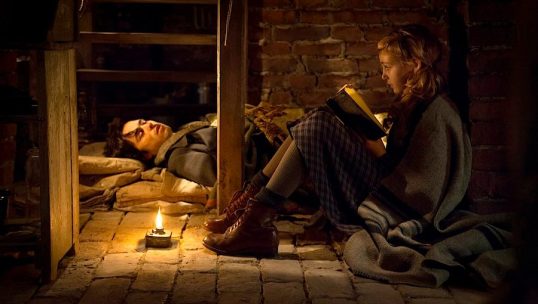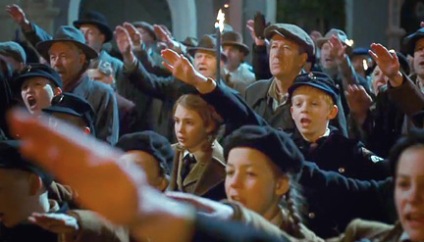The Book Thief (written by Markus Zusak)is by far one of the most powerful and amazing books I’ve ever read.
A girl named Liesel Meminger is living in Nazi Germany, and taken to live with a foster family. She finds comfort is learning to read and write and the relationships she makes with her neighbors, her foster parents and the hidden Jew in the basement are just as important. This story is written in 10 sections, each section representing a book that falls into Liesel’s hands and how not just the book everything around her changes and teaches her something new about life. Narrated by the entity of death, Liesel and her companions are shown in a different light, opposing Hitler, rather than the propaganda rich history that it holds. I highly recommend this book to any gender, age and background, as you will certainly find that you will have much in common with the characters and shall grow an attachment to the story and situation. I believe that everyone lives their own World War II in some way, and I think you learn more about yours by reading this book. It is entertaining and a quick read.
Now the best way to describe how the power of words is shown within this book is by sharing with you some of my favorite quotes!
The narrator death is portrayed as a compassionate entity with comical irony attached, who takes souls to an eternal world and cares for them and their stories.
“I say His name in a futile attempt to understand. “But it’s not your job to understand.” that’s me who answers. God never says anything. You think you’re the only one he never answers? “You’re job is to…” And I stop listening to me, because to put it bluntly, I tire me. When I start thinking like that, I become so exhausted, and I don’t have the luxury of indulging fatigue. I’m compelled to continue on, because although it’s not true for every person on earth, it’s true for the vast majority – that death waits for no man – and if he does, he doesn’t usually wait very long.” (p. 350)
There’s even a portion of love and friendship.
“ “How about a kiss, Saumensch?”
He stood waist-deep in the water for a few moments longer before climbing out and handing her the book. His pants clung to him, and he did not stop walking. In truth, I think he was afraid. Rudy Steiner was scared of the book thief’s kiss. He must have longed for it so much. He must have loved her so incredibly hard. So hard that he would never ask for her lips again and would go to his grave without them.” (p.303)
“At first Liesel could not talk. Perhaps it was the sudden bumpiness of love she felt for him. Or had she always loved him? It’s likely. Restricted as she was from speaking, she wanted him to kiss her. She wanted him to drag her across and pull her over. It didn’t matter where. Her mouth, her neck, her cheek. Her skin was empty for it, waiting…. He was her best friend. And he was a month from his death… She was saying goodbye and she didn’t even know it.” (p. 518)
“The road was cold and straight. It wasn’t long till the soldiers came with the Jews. In the tree shadows, Liesel watched the boy. How things had changed, from fruit stealer to bread giver. His blond hair, although darkening, was like a candle. She heard his stomach growl-and he was giving people bread. Was this Germany? Was this Nazi Germany?” (p. 440)
“it’s probably fair to say that in all the years of hitler’s reign, no person was able to serve the furher as loyally as me. a human doesn’t have a heart like mine. the human heart in a line, whereas my own is a circle, and I have he endless ability to be in the right place at the right time. the consequence of this is that i’m always finding humans at their best and worst. I see their ugly. and their beauty, and I wonder how the same thing can be both. still, they have one thing I envy. Humans, if nothing else, have the good sense to die.” (p. 491)
“Those images were the world, and it stewed in her as she sat with the lovely books and their manicured titles. It brewed in her as she eyed the pages full to the brims of their bellies with paragraphs and words. You Bastards, she thought. You lovely bastards. Don’t make me happy. Please, don’t fill me up and let me think that something good can come of any of this. Look at my bruises. Look at this graze. Do you see the graze inside me? Do you see it growing before your very eyes, eroding me? I don’t want to hope for anything anymore. I don’t want to pray that Max is alive and safe. Or Alex Steiner. Because the world doesn’t deserve them.” (p. 521)
“Soon, there was nothing but scraps of words littered between her legs and all around her. The words. Why did they have to exist? Without them, there wouldn’t be any of this. Without words, the Fuhrer was nothing. There would be no limping prisoners, no need for consolation or worldly tricks to make us feel better. What good were the words?” (p. 521)
“As it turned out, Ilsa Hermann not only gave Liesel Meminger a book that day. She also gave her a reason to spend time in the basement- her favorite place, first with Papa, then Max. She gave her a reson to write her own words, to see that words had also brought her to life. “Don’t punish yourself”, she heard her say again, but there would be punishment and pain, and there would be happiness, too. That was writing.” (p. 524-525)
“Words are so heavy.” (p. 526)
“Sometimes I think my papa is an accordion. When he looks at me and smiles and breathes, I hear the notes.” (p. 527)
“I have hated words and I have loved them, and I hope I have made them right.” (p. 528)
“Make no mistake, the woman had a heart. She had a bigger one than most people would think. There was a lot in it, stored up, high in miles of hidden shelving.” (p. 532)
“The rubble just climbed higher. Concrete hills with caps of red. A beautiful, tear-stomped girl, shaking the dead.” (p. 535)
“I can promise you that the world is a factory. The sun stirs it, the humans rule it.” (p. 543)


